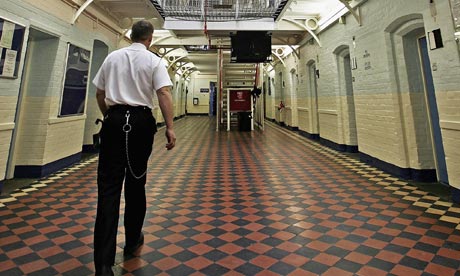via: http://www.guardian.co.uk/society/2012/sep/25/homophobia-rife-uk-prisons

Attitudes have
changed, but a 'macho culture' can still prevent staff helping victims
of homophobic abuse in prison. Photograph: Peter Macdiarmid/Getty Images
Despite moves in recent years towards eradicating discrimination against prisoners on the grounds of race or religion, the challenges facing gay men in prison have still not been addressed sufficiently by the prison service.
A letter in this month's edition of Inside Time, the national newspaper for prisoners, highlights their plight. "I am gay and very 'camp' and due to my sexual orientation I have received abuse from other inmates," writes the prisoner. He explains that when the abuse turned to threats of violence he was granted "VP status", meaning he is now classified as a vulnerable prisoner and located on the vulnerable prisoner unit.
Since becoming a VP he has lost his job in the prison education block, is allowed only one morning session of basic education each day and spends the rest of his time in his cell. "I think the way we are treated compared to 'normal' prisoners is completely unfair and unjustified," he concludes.
At any one time, it is statistically likely that there will be around 8,000 gay prisoners in the UK, yet homophobic attitudes still abound on wings and landings. As a long-term prisoner, I witnessed the predicament of those identified as being gay. Force of personality enabled some individuals to cope better than others, but in the main the norm was derision and abuse. Many were pressured to engage in sexual acts, often by their deriding antagonists or, worse, suffered serious sexual assaults, which, it was clear to me, went largely unreported to or by the authorities.
Prison rules strictly forbid sexual activity between prisoners, yet every male prison in the country has a "condom policy". Steve Jones, Terrence Higgins Trust's national director for Wales, visits a number of prisons in the south-west to support gay, bisexual and transsexual prisoners.
"There has been a shift in attitude from some of the more enlightened staff, especially those responsible for equality," he says, "but the exaggerated macho culture precludes many of the staff engaging willingly and openly with this issue to actually support gay and bisexual prisoners who want or need that additional support."
According to Jones, any advice and guidance available to gay prisoners is derisory. "Generally, the guidance would be: 'You must try and protect yourself, or keep it quiet'. If you are targeted because of your sexuality and are forced to be segregated, we have to ask: would that be tolerated if it was in relation to race or religion?"
Even the so-called condom policy is geared to traduce human dignity. "If a prisoner wants to practise safe sex he can ask at the wing office or at the healthcare centre for a condom," says Jones. "One will then be prescribed at the medicine hatch. Some prisons also demand the return of the used condom. We would like to see condoms readily available at the prison shop."
A prison service spokesman says it "does not condone or facilitate sexual relationships between prisoners. Prison doctors can make condoms, dental dams and water-based lubricants available to any prisoner, irrespective of age, if in their clinical judgment, there is a risk of the transmission of HIV or any other sexually transmitted disease."
He adds: "Discrimination, harassment and bullying will not be tolerated in any form, and swift and appropriate action will be taken to address any reports of victimisation."
The evidence, however, is that there is a significant gap between policy and practice. Robust national mechanisms to ensure the safety and equality of gay men in prison need to be introduced as a matter of urgency.
http://www.guardian.co.uk/society/2012/sep/25/homophobia-rife-uk-prisons

Sem comentários:
Enviar um comentário